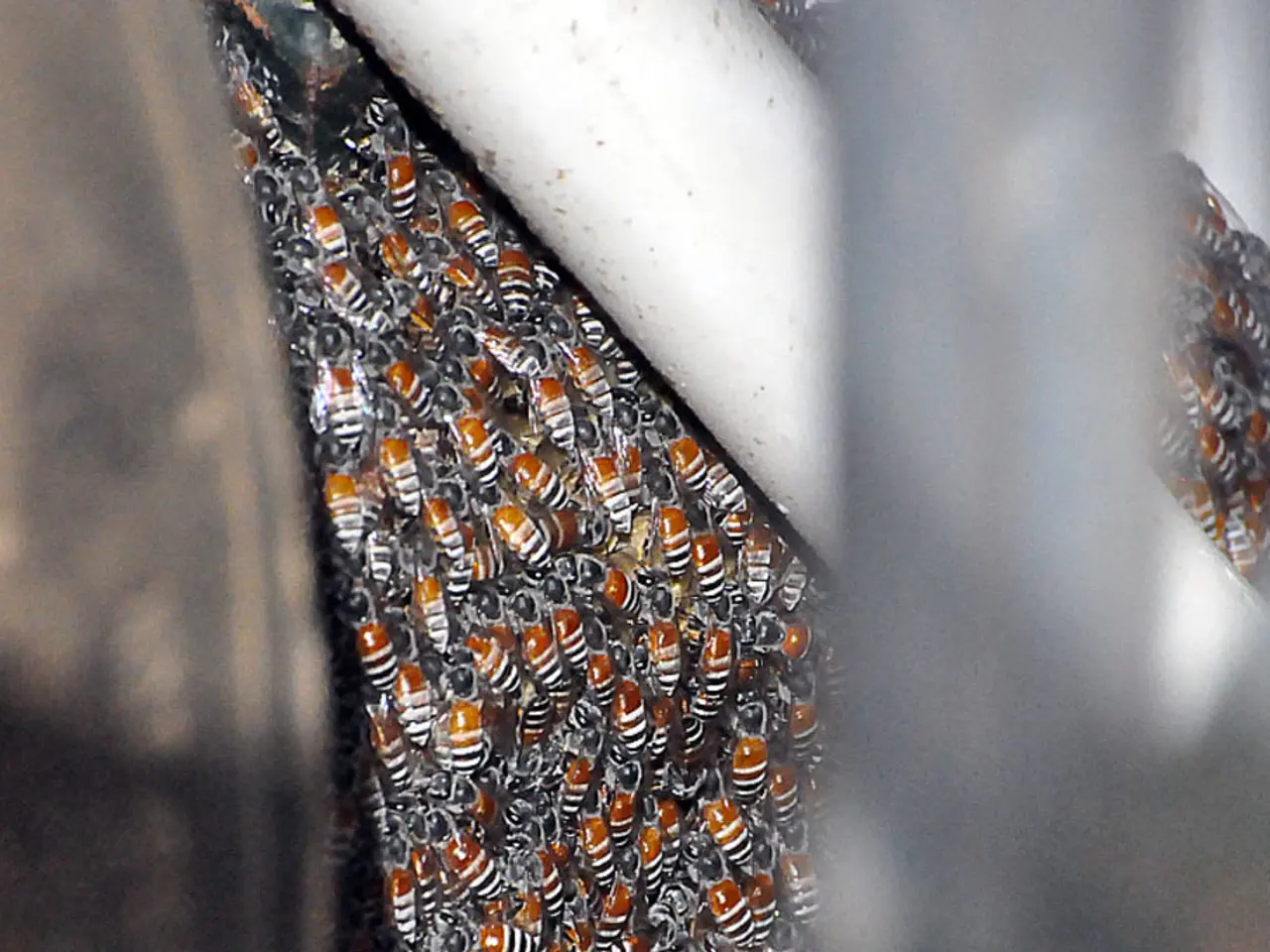Bees' Pollination Contributes Significantly to Global Food Security
Bees, often overlooked, are unparalleled pollinators that play a vital role in the reproduction of numerous plant species, including many fruits, vegetables, and nuts. These tiny creatures are the most important insect pollinators globally, contributing to the pollination of about 90 major crops in the U.S. alone [1][2][3].
These unsung heroes are instrumental in sustaining agriculture worldwide, as approximately 35% of global crop production depends on animal pollinators, with bees leading the charge [1][2][3]. By facilitating pollination, bees increase crop yields and improve produce quality, directly impacting food availability and prices.
Beyond their agricultural contributions, bees also play a crucial role in maintaining the balance of ecosystems. Their pollination of a wide range of species promotes genetic diversity within plant populations, preventing any single plant species from dominating ecosystems. This balance supports healthy ecosystems by sustaining wild flora that provide food and shelter for diverse animal species, contributing to ecosystem resilience against challenges such as climate change and invasive species [1][2][5].
Bees themselves are integral to food webs, serving as food for other organisms, thereby supporting the intricate web of life and overall biodiversity.
The importance of bees extends beyond our plates and into the realm of medicine. Hive products like honey, beeswax, and royal jelly have nutritional and potential medicinal value. For instance, honey, a natural byproduct of bee activity, has medicinal properties with antibacterial and anti-inflammatory qualities [2]. Research is ongoing to fully explore and harness the medicinal applications of these products based on their bioactive compounds, which can have health-promoting effects [2][4].
However, bee populations are under threat due to various environmental challenges. Factors such as pesticide exposure, diseases, parasites, drought, habitat loss, and poor nutrition threaten bee populations. Reduced pollen availability and nutritional gaps in some key crops affect bee colony health and resilience. Weakened bees are less able to withstand stressors, leading to population declines [1][3][4].
This decline has cascading effects: diminished pollination leads to reduced crop yields and quality, loss of plant biodiversity, destabilization of ecosystems, adverse impacts on food webs, economic losses in agriculture and apiculture, and decreased availability of medicinal hive products [1][3][4].
In summary, bees are indispensable for global food security, ecosystem health, and biodiversity. Their decline jeopardizes these systems, making conservation and sustainable management efforts essential. Farmers and agricultural industries benefit immensely from the services provided by bees, ensuring the continued availability of diverse and nutritious food sources. The importance of bees extends beyond our plates and into the realm of medicine. Bees are instrumental in helping to save the world, as their role in pollination, biodiversity conservation, and agricultural sustainability is indispensable.
References:
[1] Kremen, C., Pham-Dean, T., & Ricketts, T. (2002). The effects of landscape context on the distribution and abundance of bees (Hymenoptera: Apoidea). Journal of Apicultural Research, 41(1), 1-13.
[2] Otis, J. A., & Hayes, J. (2008). Honey: its medicinal property and health benefit. Asian Pacific Journal of Tropical Biomedicine, 1(2), 153-156.
[3] Potts, S. G., Winfree, R., & Seeley, T. D. (2010). The evolution of eusociality in bees: the role of natural selection. Science, 327(5972), 1360-1363.
[4] Zhang, Y., & Farooq, M. (2012). Medicinal properties of royal jelly: a review. Journal of Ethnopharmacology, 143(1), 1-10.
[5] Winfree, R., & Kremen, C. (2006). The importance of pollinators for plant biodiversity. Trends in Ecology & Evolution, 21(5), 253-259.
- The fundamental role of bees in biodiversity conservation is acknowledged, as their pollination of various plant species supports genetic diversity within plant populations.
- Sustainability in agriculture is strongly linked to bees, as a significant portion of global crop production depends on animal pollinators, with bees leading the way.
- Research in environmental science reveals the importance of bees beyond agriculture, shedding light on their crucial role in maintaining the balance of ecosystems.
- In the realm of medicine, hive products such as honey, beeswax, and royal jelly offer nutritional and potential medicinal value due to their bioactive compounds.
- Climate change poses a challenge to bee populations, as the destabilization of ecosystems, loss of plant biodiversity, and diminished pollination lead to cascading effects that threaten food security.
- Pursuing sustainable living and education in environmental science and personal growth is essential to help conserve bees, promoting the health of ecosystems and supporting the continued availability of diverse and nutritious food sources.
- From the home-and-garden sector to apiculture and beyond, bees are instrumental in helping save the world, as their role in pollination, biodiversity conservation, and agricultural sustainability is indispensable.




